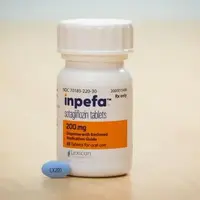Generic name: sotagliflozin
Drug class: Miscellaneous cardiovascular agents
Dosage form: oral tablet
Availability: Prescription only
Pregnancy & Lactation: Risk data available
Brand names: Sotagliflozin
What is Inpefa?
Inpefa is an oral, once-daily tablet that contains sotagliflozin which may be used to reduce the risk of cardiovascular death, hospitalization for heart failure, and urgent visits for heart failure in adults with heart failure, or type 2 diabetes mellitus, chronic kidney disease, and other cardiovascular risk factors.
Inpefa was approved on May 26, 2023.
Warnings
Do not use in people with a history of hypersensitivity reactions to sotagliflozin or any of the inactive ingredients of Inpefa.
Patients should be hemodynamically stable before starting treatment. Correct volume status before initiating and monitor for signs and symptoms of hypotension (low blood pressure) or dehydration during treatment.
If possible, withhold at least 3 days before major surgery or procedures requiring prolonged fasting.
Risk for ketoacidosis
Consider ketone monitoring in patients with type 1 diabetes mellitus or others at risk for ketoacidosis. Discontinue Inpefa if ketoacidosis is suspected and wait until ketoacidosis has resolved before restarting.
Urinary tract infections
Inpefa can increase the risk of urinary tract infections including serious infections such as urosepsis and pyelonephritis. Monitor for signs and symptoms during therapy and treat them promptly.
Hypoglycemia with concomitant insulin and insulin secretagogues
Lower dosages of insulin or insulin secretagogues may be required.
Necrotizing fasciitis of the perineum (Fournier’s Gangrene)
May increase the risk of necrotizing fasciitis of the perineum. Monitor patients for pain, tenderness, erythema, fever, malaise, or swelling in the groin area. If present, discontinue Inpefa and treat urgently.
Genital fungal infections
Monitor and treat as appropriate.
Laboratory tests
Do not use urinary glucose tests in patients taking SGLT2 inhibitors because SGLT2 inhibitors increase the excretion of glucose in the urine. Use alternative testing methods to monitor glucose levels.
1,5-anhydroglucitol (1,5-AG) assays are also unreliable in assessing glucose levels in patients treated with sotagliflozin.
Pregnancy
Inpefa is not recommended during the second or third trimesters of pregnancy, based on animal data that shows adverse renal effects in the fetus. Women of childbearing age should tell their doctor if they intend to become pregnant. If you inadvertently become pregnant, tell your doctor immediately.
Lactation
Inpefa is not recommended while breastfeeding.
Volume depletion and hypotension
Those with renal impairment (eGFR < 60 mL/min/1.73 m2), seniors, or those on loop diuretics may be at increased risk for volume depletion or hypotension. Assess volume status before initiation and monitor for signs and symptoms of hypotension during therapy.
How should I take Inpefa
Inpefa is taken once a day by mouth. It should be taken no more than one hour before breakfast.
Swallow tablets whole, do not cut, crush, or chew.
Research has shown that initiating treatment with Inpefa before or upon hospital discharge can reduce hospital readmissions for heart failure, urgent visits for heart failure, and cardiovascular death.
Dosing information
Adults: The recommended starting dose is 200mg orally once daily. This may be increased to 400mg once daily after at least 2 weeks if tolerated. Reduce the dosage back to 200mg once daily if not tolerated or side effects occur.
Before Taking
You should not use Inpefa if you are allergic to sotagliflozin or any of the inactive ingredients contained in the tablet.
Tell your doctor if you:
- Are dehydrated
- Currently have an infection
- Don’t drink much fluid during the day
- Drink alcohol
- Follow a ketogenic diet
- Have had ketoacidosis before
- Have a history of pancreatic disorders
- Have a restricted food intake.
Inpefa can cause ketoacidosis, which can be life-threatening and can occur even when your blood glucose levels are normal, and in people with either type 1 or type 2 diabetes. Your healthcare provider may ask you to monitor your ketone levels. You should also avoid becoming dehydrated, drinking alcohol to excess, or eating a reduced or ketogenic diet as these may increase your risk of developing ketoacidosis. If symptoms of ketoacidosis occur, discontinue Inpefa and seek immediate medical attention.
What happens if I miss a dose?
Take the medicine as soon as possible, but skip the missed dose if it has been more than 6 hours since you were supposed to take Inpefa. Do not take two doses at one time.
What happens if I overdose?
Seek emergency medical attention or call the Poison Help line at 1-800-222-1222.
Inpefa side effects
The most common side effects of Inpefa include urinary tract infection, volume depletion, diarrhea, and hypoglycemia.
Other serious side effects include:
- Diabetic Ketoacidosis
- Genital fungal infections
- Necrotizing fasciitis of the perineum.
Call your doctor at once if you have:
- a serious allergic reaction
- dry skin or mouth or feel very thirsty
- fruit-smelling breath
- headache
- severe dizziness
- problems with balance or muscle movement or stiffness
- fast, deep breathing
- fast or pounding heartbeats
- a fever
- nausea or vomiting
- need to pee more often or urgently, pain or discomfort when peeing, or pain in your groin area
- feel very tired
- signs of an infection.
This is not a complete list of side effects and others may occur. Call your doctor for more advice about side effects. You may report side effects to FDA at 1 800 FDA 1088.
See more: Inpefa Side EffectsWhat other drugs will affect Inpefa?
Tell your doctor about all your other medicines, especially:
- Digoxin – there may be an increase in the absorption of digoxin with Inpefa and monitoring is necessary
- Rifampicin and other uridine 5'-diphospho-glucuronosyltransferase (UGT) inducers – may reduce the effectiveness of sotagliflozin
- Lithium – may cause a decrease in lithium concentrations.
This list is not complete. Other drugs may affect sotagliflozin, including prescription and over-the-counter medicines, vitamins, and herbal products. Not all possible drug interactions are listed here.




